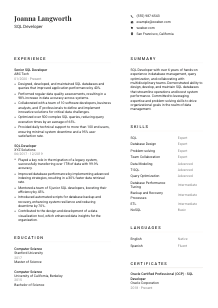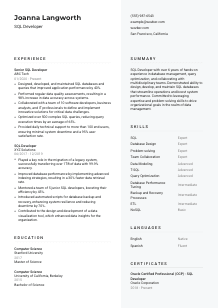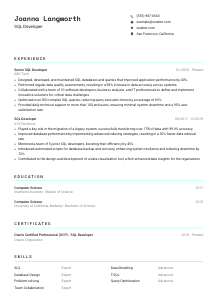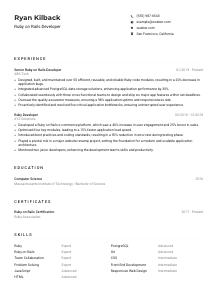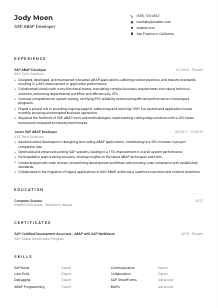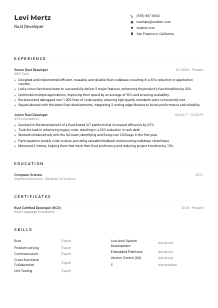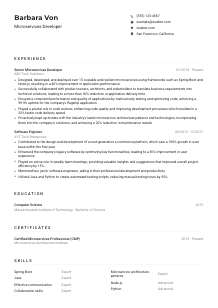SQL Developer CV Example
Writing queries, but your CV isn't returning results? Dig into this SQL Developer CV example, optimized with Wozber free CV builder. It illustrates how to structure your code-savvy career to meet job criteria, ensuring your professional journey has the perfect join with the right opportunity!
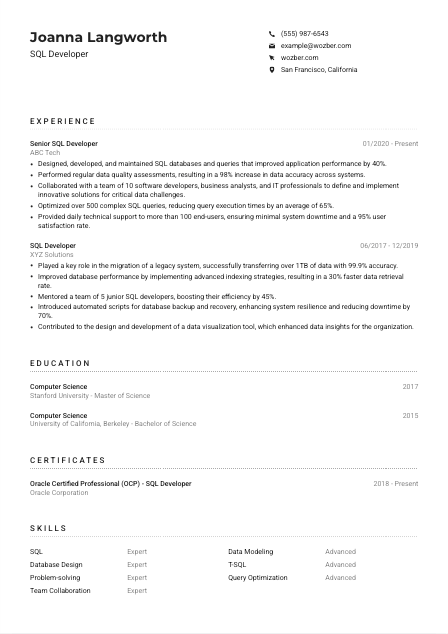
How to write a SQL Developer CV?
Hey there, future SQL wizard! If you're eyeing that coveted SQL Developer position and want your CV not just to pass but to stand out in the hiring manager's inbox, you're in the right place. Crafting a CV tailored for a SQL Developer role requires more than listing your previous jobs and educational credentials; it requires strategy, precision, and a bit of SQL flair.
With Wozber's free CV builder at your disposal, including its ATS-friendly CV templates and ATS CV scanner, this guide will walk you through how to create a CV that not only ticks all the boxes but also dazzles. So, tighten your seatbelt, and let's get started on creating a CV that'll make those job opportunities come querying for you!
Personal Details
Much like a well-written SQL query, the personal details on your CV should be clean, error-free, and efficient in delivering the desired result – landing you an interview. Here's how to customize this section with the precision of a SQL Developer:
1. Boldly Brand Your Name
Think of your name as the primary key of your CV; it should be unique and prominently displayed. Opt for a bold, easy-to-read font that sets the stage for the professional document that follows.
2. Job Title Precision
Directly below your name, include the job title you're applying for, in this case, 'SQL Developer'. This not only shows you've tailored your CV for the role but also helps in catching the eye of ATS systems looking for this keyword.
3. Essential Contact Info
Make your contact information straightforward and professional. A current phone number and a professional email address are must-haves. Remember, an email like 'first.last@example.com' speaks volumes more about your professionalism than 'party.animal2023@example.com'.
4. Geo-Tagging Yourself
"San Francisco, California" isn't just a location; it's meeting a crucial job requirement up front. By clearly listing your city and state, you immediately reassure the hiring team that you're ready and in the right place for the job. Relocation concerns? Addressed from the get-go.
5. A Link to Your Professional Universe
If you have a LinkedIn profile or a personal website showcasing your SQL projects or portfolio, include it. Ensure these profiles are polished and reflect the same professionalism as your CV. This step is like adding a VIEW to your SQL database; it provides a holistic perspective of your professional landscape.
Takeaway
The Personal Details section is your CV's initial handshake with the ATS and potential employers. It's more than a ritual; it's strategic positioning. With each detail carefully input like a well-crafted SQL command, you're ensuring that your introduction is clear, professional, and directly aligned with the SQL Developer role. Let's proceed to construct the rest of your CV with the same detail-oriented precision.





Experience
The Experience section is where you get to show off the databases you've optimised, the queries you've fine-tuned, and the SQL magic you've performed. Here's how to align your experience with the job description of an SQL Developer, effectively using your past wins as a forecast for future successes:
- Designed, developed, and maintained SQL databases and queries that improved application performance by 40%.
- Performed regular data quality assessments, resulting in a 98% increase in data accuracy across systems.
- Collaborated with a team of 10 software developers, business analysts, and IT professionals to define and implement innovative solutions for critical data challenges.
- Optimised over 500 complex SQL queries, reducing query execution times by an average of 65%.
- Provided daily technical support to more than 100 end‑users, ensuring minimal system downtime and a 95% user satisfaction rate.
- Played a key role in the migration of a legacy system, successfully transferring over 1TB of data with 99.9% accuracy.
- Improved database performance by implementing advanced indexing strategies, resulting in a 30% faster data retrieval rate.
- Mentored a team of 5 junior SQL developers, boosting their efficiency by 45%.
- Introduced automated scripts for database backup and recovery, enhancing system resilience and reducing downtime by 70%.
- Contributed to the design and development of a data visualization tool, which enhanced data insights for the organisation.
1. Decode the Job Description
Begin by laying out the job description and highlighting skills and experiences it emphasizes. For SQL Developers, this often means SQL development, database management, and perhaps a sprinkle of teamwork or problem-solving.
2. Structuring Your Experience
List your experiences in reverse chronological order. Each entry should start with your job title, then the company name, followed by your tenure there. This structure is not just for human eyes; it also helps ATS systems to easily parse and understand your professional trajectory.
3. SQL-Specific Achievements
For each role, draft accomplishment statements that resonate with the SQL Developer position. Did you 'Optimise over 500 complex SQL queries, reducing execution times by an average of 65%'? That's the kind of statement that makes hiring managers and ATS systems take notice.
4. Quantify Your Impact
Wherever possible, add numbers to your achievements. Enhanced application performance by 40%? Reduced downtime by 70%? These are the metrics that paint a vivid picture of your capabilities and impact.
5. Relevance Is Key
Keep your descriptions focused on responsibilities and achievements relevant to SQL Development. It's tempting to list every skill or project, but if it doesn't directly relate to SQL development or database management, consider leaving it out for clarity and precision.
Takeaway
Your experience section is your professional log; each entry ensures the hiring manager knows you're not just acquainted with SQL - you live it. It's proof that you've not only interacted with databases but have left them more optimised and efficient than before. As you move onto the Education section, think of it as creating a stored procedure: it's reusable, impactful, and a testament to your expertise.
Education
While experience might be the meat of your CV, your educational background lays the stone foundation of your knowledge in Computer Science and SQL development. Tailoring this section helps establish your qualification baseline. Here's how:
1. Highlight Key Requirements
The job posting explicitly asks for a 'Bachelor's degree in Computer Science, Information Systems or a related field.' Make sure this requirement is explicitly met in your Education section to pass both human and ATS checklists.
2. Clear and Concise Structure
Maintain a simple structure that lists your degree, the school attended, and the graduation date. This section is about quick verification of your credentials, so keep it easy to scan for both ATS and human eyes.
3. Match Job Criteria
Tailor the degree titles to match the job criteria perfectly. For instance, if you have a 'Master of Science in Computer Science,' make that connection apparent, especially since it aligns so closely with the job's requirements.
4. Relevant Courses and Achievements
If younger in your career or if your degree isn't directly in Computer Science but still relevant, listing pertinent courses can help bridge that gap. Furthermore, any achievements such as 'Dean's List' or 'Cum Laude' add merit to your educational background.
5. Additional Learning
For a field as ever-evolving as SQL Development, showing continuous learning like attending relevant workshops or online courses (even if they didn't culminate in a degree) can demonstrate your dedication to staying up-to-date and your passion for the field.
Takeaway
With your education section meticulously defined, you've successfully laid out the academic foundation that supports your SQL expertise. This section, while seemingly straightforward, ensures you meet the baseline qualifications and showcases your commitment to your development career. Next up, let's dive into certifications – your extra arsenal in proving your SQL prowess.
Certificates
In the dynamic field of SQL Development, certifications can be a golden ticket to proving your skills and dedication. Whether it's becoming an Oracle Certified Professional or earning a certificate in data modeling, these accolades can significantly bolster your CV. Here's how to feature them:
1. Align with Job Requirements
While the job posting might not explicitly demand certifications, including relevant ones like 'Oracle Certified Professional - SQL Developer' can set you apart. It shows commitment to your profession and hands-on expertise.
2. Prioritize Relevance
Including every certificate you've ever earned could dilute the impact of the most relevant ones. Prioritize those closely linked to SQL development, database management, and performance optimisation.
3. Dates Matter
If a certification has a validity period or if it's a particularly recent achievement, adding the date can highlight your continuous learning ethic. For time-sensitive credentials, this also assures hiring managers of your current expertise.
4. A Continuous Journey
The tech industry evolves rapidly, and so should you. Staying up-to-date with the latest certifications not only enhances your skillset but also demonstrates your adaptability and eagerness to grow within your field.
Takeaway
By strategically listing your certifications, you've loaded your CV with proof of your enduring commitment and specialized expertise in SQL development. Think of these credentials as robust indexes in your database of skills; they optimise your appeal to the hiring manager by making your qualifications quickly retrievable. Now, let's tailor your skills section to match the query results we're aiming for.
Skills
The Skills section of your CV is like a high-performing database index; it should quickly guide the hiring manager to the most relevant information. Here's how to optimise this section for an SQL Developer role:
1. Understand the Requirements
Start with a deep dive into the job description, identifying both hard and soft skills. For SQL Developers, 'strong proficiency with SQL,' 'data modeling,' and 'database design' are the technical competencies explicitly mentioned, alongside soft skills like 'excellent problem-solving' and 'team collaboration.'
2. Curate Your Skill Inventory
List the skills you possess that directly align with the job description. Think of this step as creating a VIEW that presents only the most relevant data – your skills – in an easily digestible format for the hiring manager.
3. Simplify and Organize
While it might be tempting to include an exhaustive list of every skill in your repertoire, prioritizing those most pertinent to the SQL Developer role will make your CV more effective. A cluttered skills section can be overwhelming and detract from your core strengths.
Takeaway
With your skills section finely tuned, you're showing the hiring manager at a glance why you're an exceptional match for the SQL Developer role. You've essentially optimised your CV 'database' so that it passes the ATS 'query' with flying colors, presenting your most relevant skills upfront. Next, let's turn our attention to the languages you speak, another facet of your diverse professional skill set.
Languages
In our interconnected world, the ability to communicate in multiple languages can give you a significant advantage, especially in diverse and international teams. Here's how to highlight your linguistic prowess on your CV for an SQL Developer position:
1. Job Language Requirements
First, ascertain if the job posting specifies any language requirements. For an SQL Developer, the proficiency to 'operate in an English-speaking work environment' is crucial. Ensure you meet and highlight this requirement prominently.
2. Prioritize and Provide Proof
If English is a requirement, list it first and, if applicable, note your proficiency as 'Native' or 'Fluent.' For additional languages that you know, follow in order of proficiency. This showcases not just your language skills but also your preparedness for a global workplace.
3. Offer a Range
Besides the required language, list others you are proficient in. This shows versatility and might open up opportunities in projects or roles that require interaction with clients or teams from different linguistic backgrounds.
4. Honesty in Proficiency
Clearly define your level of proficiency for each language. Use terms like 'Native,' 'Fluent,' 'Intermediate,' and 'Basic' to give an accurate picture of your ability to communicate.
5. Role and Global Scope
For SQL Developer roles that may involve working with international databases or teams, your language skills can be a unique asset. Highlighting these skills can distinguish you in a pool of qualified candidates.
Takeaway
By aligning your language skills with the job's linguistic requirements and showcasing your ability to navigate a global work environment, you're presenting yourself as not just a skilled SQL Developer but a versatile professional ready for today's global workplace. These linguistic bridges can lead to richer team collaborations and a broader range of projects. With this comprehensive communication skill set outlined, let's synthesize your qualifications into a compelling summary.
Summary
The summary is where you aggregate all the elements of your professional journey into a compelling narrative. Here's how to distill your SQL Developer expertise into a concise and powerful summary:
1. Grasp the Job's Core
Before you start writing, revisit the job description to grasp fully what makes an ideal candidate. This will help you emphasize the most relevant aspects of your experience and skills in your summary.
2. Start with a Strong Introduction
Begin with a statement that encapsulates your professional identity as an SQL Developer. Mention your total years of hands-on experience and highlight your specialization or niche within SQL development.
3. Address the Highlights
Pick out key skills and accomplishments that directly align with the job requirements. Whether it's improving system performance, database management, or collaborative project leadership, let these highlights tell your professional story.
4. Keep It Brief
Your summary should be a teaser that entices hiring managers to delve into the details of your CV. Aim for 3-5 sentences that paint a vibrant picture of your professional capabilities and potential contributions.
Takeaway
With a summary that tightly encapsulates your professional identity, skills, and accomplishments, you've created a compelling opening argument for why you're the ideal candidate for the SQL Developer position. This brief narrative sets the tone and primes the hiring manager to see you as a standout candidate as they proceed to the detailed chapters of your CV. Now, it's time to deploy your updated CV into the job market and watch as opportunities come querying your way!
Launching Your SQL Developer Career with Wozber
Congratulations, you've meticulously crafted a CV tailored for your dream SQL Developer position, optimised every section for ATS compatibility using Wozber's free CV builder, including an ATS-friendly CV template, and equipped it with precise, targeted content that mirrors the job description perfectly. Your CV is now a finely tuned query, ready to fetch the best job opportunities out there. Remember, this is just the beginning of your journey; continually refine your skills and CV, staying adaptable and keen to the constantly evolving landscape of SQL development.
The world of data awaits your expertise. Go forth and leave your mark!

- Bachelor's degree in Computer Science, Information Systems or a related field.
- Minimum of 3 years of experience in SQL development and database management.
- Strong proficiency with SQL and proven experience with data modeling and database design.
- Familiarity with database performance tuning, optimization, and backup and recovery processes.
- Excellent problem-solving skills and the ability to work in a collaborative team environment.
- Ability to operate in an English-speaking work environment.
- Must be located in or willing to relocate to San Francisco, California.
- Design, develop, and maintain SQL databases and queries for various applications and systems.
- Perform regular data quality assessments and execute necessary data cleansing operations.
- Collaborate with software developers, business analysts, and IT professionals to define and provide solutions for data challenges.
- Optimize SQL queries and report performance to ensure efficient data retrieval and system responsiveness.
- Provide technical support and guidance to end-users and other stakeholders as needed.





